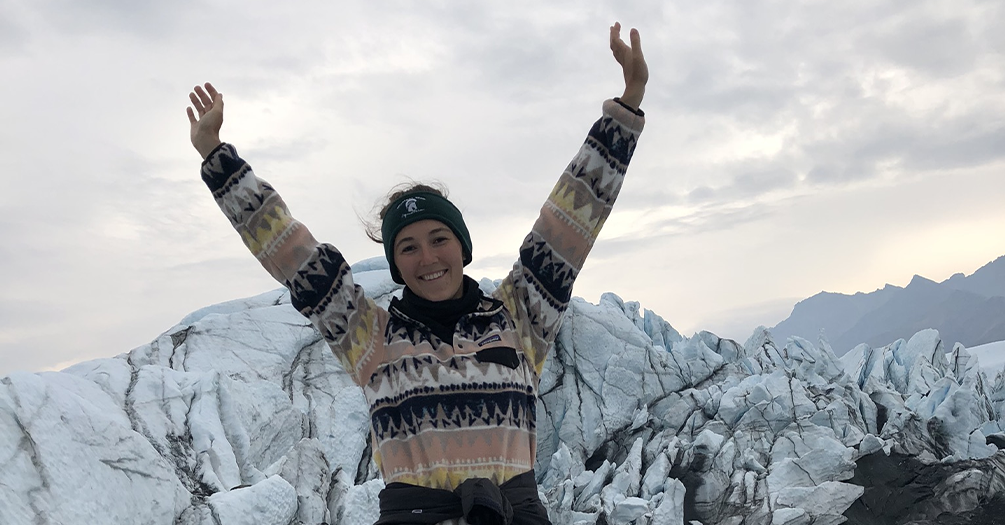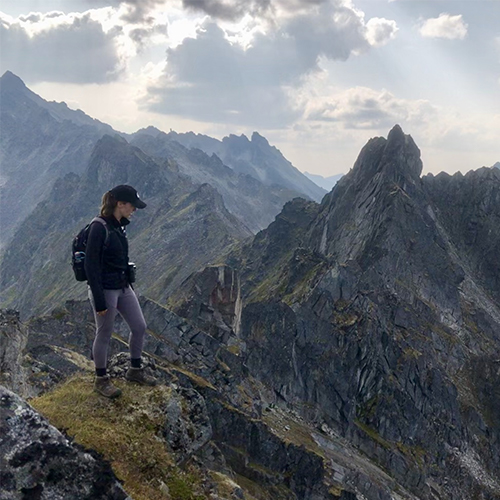Journey to Alaska: Online MPH Student Embarks on New Career

Delaney Preston, MPH '21
Health Educator, Bristol Bay Area Health Corporation
Two years ago, Delaney Preston was just starting her Master of Public Health, logging on as part of Michigan Public Health’s first cohort of online master’s students in the Population and Health Sciences program. Recently, we caught up with Delaney as she prepares to finish out her MPH program and graduate this April. Since beginning the program, Delaney’s life changed a lot. She accepted her dream job and moved from Michigan to Alaska. At the start of her second year in the program, Delaney packed up to join Bristol Bay Area Health Corporation as a Health Educator in the midst of the pandemic, all while continuing her studies online.
During your master’s program, you switched careers, moving from the Air Force to a community health organization in rural Alaska. What has that been like?
By the time I'd taken the first semester of courses, I was chomping at the bit, ready to start looking at jobs. I’d originally planned to stay at my last job through the end of my master's program, but I was excited and I wanted to start applying.
I have family who live in Anchorage, so I've always played with the idea of coming up here because I love Alaska. After discovering this role, I continued applying to all these different jobs, and every time I was comparing them to the work that Bristol Bay said I would get to do up here—working with a high-risk population, getting to fly around to the 28 different villages we serve—but more importantly, the work up here just offered more opportunity for direct community work and community engagement, so I held out for this opportunity. There's so much you can do with a Master of Public Health degree. I was amazed at the options I had after a year of study.
How did your education and experiences with Michigan Public Health prepare you for life after graduation?
I’ve reflected a lot on how great it is that I've started my public health career in concert with finishing my degree. It's been great to have that support—that little bit of hand-holding—in my last year of the program and my first year of working in my “big girl” job. When I have had concerns come up in my job that I needed help with, I've brought those into class, to my classmates. —And the projects I’ve worked on have been extremely connected to the work that I'm doing at my job. Right now, our organization is trying to expand on its population health and preventative health services, so there’ve been many moments of, “Oh, I learned this in lecture!”
Later on, I was even able to tie my applied experience projects (APEx) directly to my work with the Bristol Bay Area Health Corporation. In the APEx course, we get to engage with a public health organization to help create a piece of work, like a report or an informational flyer, that will benefit their local public health efforts. With my first APEx project, I highlighted the Healthy Alaskans program’s goals to distribute and give out to our staff and leadership here at the hospital and to other stakeholders in our communities, so they could understand what the Healthy Alaskans initiative is, what it’s goals are, and why we as an organization should care about these goals. That led me to my other APEx work product, which was an indicator report that explored, within 30 determined goal areas, the health statistics of our region, Bristol Bay, compared to Alaska and to the US. For my Integrated Learning Experience (ILE) — our written capstone work, I am doing health needs assessment for our people, specific to our communities here.

Delaney explores the Alaskan outdoors.
How has the Population and Health Sciences program changed the way you approach your public health work?
My program helped me develop an understanding of what I like to learn about and what I was passionate about. In your first two semesters, you're taking the basics in the core fields of public health, so you can really understand what those areas are, what they mean, how you enjoy learning about them. I'm really, really grateful that the program is set up the way it is. It gives you the opportunity to get a taste of everything first before you jump into an elective series.
The program has done a great job at helping me look at the needs of a community—finding all the different challenges and barriers that impede people's ability to be healthy, and figuring out how we can address those. That approach has been eye-opening. Especially working with a primarily native population, recognizing there are different cultural beliefs, there are different cultural needs, there are different challenges to living in remote and rural Alaska. There are huge disparities in health statistics between our native population and the non-native population. I have to ask, “How do we address those to achieve health equity for the native population?”
For me, being a white person going into a primarily native population, I'm very aware of the privileges I've had and how that has impacted my health. My program has done a great job of making me reflect on that and avoiding going into situations like this with an idea that I know better than the people in this community because I have a degree. Instead, I recognize the fact that the population here has been living—and been healthy—longer than I can even really comprehend, so how can I learn from them? And how do I help enhance their health based on their knowledge?
The coronavirus pandemic hit just as you were finishing your first year of your master’s work. How did the pandemic affect your work as a public health student?
In this program I got to experience the pandemic response, and the vital role public health professionals have played in the pandemic worldwide.
Around the time the pandemic was hitting full swing and things were shutting down, our cohort was going into the population health class with Dr. Sharon Kardia. In that class, she was going to do a simulation project around the opioid epidemic. But instead, she asked us if we wanted to do that project or if we would rather shift things around and do something related to COVID-19.So, we voted and decided we wanted to do our projects around the pandemic. That was really cool, to adapt like that.
We had a wide variety of different research areas. We had people who were looking at the science of the makeup of the virus and how it spreads. My project looked at the risk mitigation strategies that countries in Asia were taking for going back to work.
During that time, Dr. Kardia was on committees that were helping inform the university’s response to the pandemic as well as the State of Michigan’s response. It felt like we were part of that effort. It was exciting to see and hear Dr. Kardia talk about her work and how it was helping to inform decision-making at these high levels. I remember thinking, “Look at how public health professionals are going to shine,” so that was really exciting.
When you look back on your time in the Population and Health Sciences program, what surprised you most about the experience?
It's been amazing to me how connected to my classmates and my professors I’ve gotten to be. There was some awkwardness at first, just trying to get our feet wet, but now it's cool to see how comfortable everyone's gotten with each other and with the professors. As an online cohort, we're absolutely still able to connect.
We've worked with Dr. Ella August and Dr. Kardia for the last year while doing our APEx projects and ILE and it's been so great to have their encouragement. You can tell how much both of them really care about seeing us succeed and how they’re excited for our work.
All the professors have been so supportive. I feel more support and connection in this master's program—even being online and four time zones away—than I did in my in-person undergrad experience. I think that has a lot to do with the size of our cohort and often feeling like we're just having a conversation. In those smaller settings where we've got five to 10 classmates, you get to know each other and share opinions and ideas. I’ve been so pleasantly surprised at that connection.
What plans do you have after graduation?
Well, my new coworkers have already decided that we’re going to do something to celebrate my graduation.They’re really an amazing group of people. They’ve been so sweet and welcoming!
But, next, I plan on relaxing a little and enjoying my first Alaskan summer. I moved up here in the fall and I'm very excited to get outdoors and explore. I'm also excited to get more experience, addressing health inequities here. There's a lot of work that can get done.
Looking forward, I’m playing with the idea of, maybe in a year, going back to school to pursue a doctorate in public health. I think I’d like to look specifically at health equity because, as I’ve come to learn, that's what I'm really very passionate about.
Read more about Delaney's early journey in public health here.
